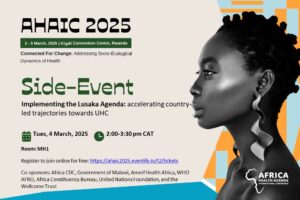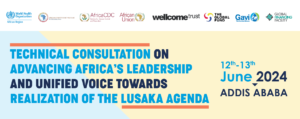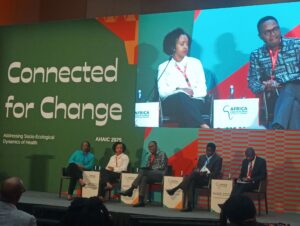The Lusaka Agenda: Transforming Health Investments for Africa’s Future
- September 3, 2025
- Global Health Initiatives / Lusaka Agenda
- By The Bureau
The Lusaka Agenda
Advancing Africa’s Ownership in Global Health 
The African Constituency Bureau (ACB) plays a strategic and catalytic role in advancing the Lusaka Agenda—Africa’s collective blueprint for transforming its engagement with Global Health Initiatives (GHIs). As the coordination and policy platform representing 48 African countries on the Global Fund Board, ACB bridges national priorities, regional coordination, and global governance, ensuring African voices shape how health investments are aligned, governed, and delivered.
What is the Lusaka Agenda?
Launched in December 2023, the Lusaka Agenda outlines five transformative shifts to enhance the effectiveness, equity, and sustainability of global health investments in Africa:
- National ownership and alignment with country priorities
- Coherent and equitable implementation of health investments
- Increased domestic financing and mutual accountability
- Strengthened primary health care systems
- Streamlined governance and coordination among GHIs
The Agenda responds to long-standing concerns over fragmented, vertical, and donor-led programming, and reasserts Africa’s right to lead its health investment agenda in partnership with responsive and respectful global stakeholders.
ACB’s Unique Role in the Lusaka Agenda:
As an early champion and technical convener of the Lusaka Agenda process, ACB is uniquely positioned to deliver on its implementation, leveraging its position in GHI governance to ensure alignment, accountability, and political commitment across the continent. ACB’s engagement spans four main areas:
- Bridging National, Regional, and Global Health Governance
ACB advocates for the adoption of Lusaka Agenda shifts within GHI platforms—most notably the Global Fund—through Board engagement, constituency coordination, and governance reform proposals.
- Continental Institutionalisation and Alignment
ACB co-organized the June 2024 Technical Consultation alongside WHO-AFRO and Africa CDC, which produced the Continental Roadmap for Lusaka Agenda implementation. The roadmap was later endorsed by African Ministers of Health at the WHO-AFRO Regional Committee (August 2024, Brazzaville).

- Accountability
ACB worked with Africa CDC and the African Union Commission to design the Lusaka Agenda Accountability Framework. It contributed to partner consultations, supported civil society engagement (100+ CSOs), and participated in defining hosting and coordination mechanisms for the framework.
- Multi-Stakeholder Engagement
ACB co-develops regional implementation concepts and funding proposals, and facilitates dialogue among countries, regional actors, donors, civil society, and technical partners. ACB also plays a key role in mobilizing CSO voices, including during high-profile events such as WHA78 and the WHO-AFRO webinars as well as Africa CDC and AU forums.
Champion Countries: WHO-AFRO Leads, ACB Collaborates
ACB does not provide direct technical support to Lusaka Agenda Champion Countries—that responsibility rests with WHO-AFRO. However, ACB has been an active collaborator from the outset by:
- Supporting the identification of champion countries
- Participating in the monitoring of progress
- Facilitating peer-to-peer learning and elevating national voices in continental forums
Examples of Engagement:
- Malawi shared its “One Plan, One Budget, One Report” model during WHO-AFRO’s June 2025 webinar
- DRC presented progress in aligning emergency health systems
- South Sudan and Ethiopia shared implementation status and lessons through LAWG learning platforms
Join the Mission
The Lusaka Agenda is a moment of transformation. ACB stands ready to deepen its role in anchoring this shift—connecting political voice, governance reform, and continental alignment.